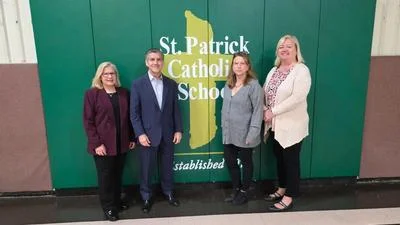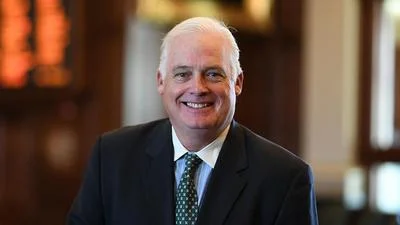The Illinois Council on Aging met March 16 to nominate officers.
Here are the meeting's minutes, as provided by the council:
The Illinois Department on Aging "works to improve the quality of life for Illinois’ older citizens by helping them live independently in their own homes and communities."
MINUTES ILLINOIS COUNCIL ON AGING MEETING
TELECONFERENCE
ILLLINOIS DEPARTMENT ON AGING OFFICES
ONE NATURAL RESOURCES WAY – ROCK RIVER CONFERENCE ROOM SPRINGFIELD, ILLINOIS
160 NORTH LASALLE, SUITE N-700 CHICAGO, ILLINOIS
WEDNESDAY, MARCH 16TH 2016 9:00 A.M. – Noon
MEMBERS PRESENT: John Hosteny J. Diane Adams-Alsberry Bernarda Wong
MEMBERS ON TELEPHONE: Phyllis Mitzen Steve Wolf Betty Martz Mary Jane Angelis Anthany Frazier Ram Gajjela Paulette Hamlin Margaret Huyck Talat Khan Mubarak Mirjat Lee Moriarty Dana Rosenzweig Eugene Verdu Charles Crowder
MEMBERS ABSENT: Rev. Melvin Grimes Robert O’Connor Anna Oestreich Sen. Julie Morrison Sen. Sam McCann Sen. Mattie Hunter, Rep. Dwight Kay Rep. Ron Sandack
VISITORS: None
DEPARTMENT ON AGING STAFF: Jean Bohnhoff, Director Jennifer Reif, Deputy Director Elizabeth Delheimer, Manager – Div. of Community Relations & Outreach, Council Liaison David Weibring, Manager – IT/CIO Jose Jimenez, Manager – Div. of Home & Community Based Services Lora McCurdy, Manager – Div. of Planning, Research & Development Jodi Becker, Manager – Div. of Finance & Administration Brent Ellis, Legislative Liaison Jessica Blood, Administrative Assistant to the Director
SUMMARY
Opening:
The meeting was called to order by John Hosteny, Chairman at 9:06am.
The roll call was taken by Secretary Steve Wolf.
Staff members from the Department on Aging introduced themselves.
Chairman Hosteny opened the meeting, welcomed Director Bohnhoff to her first meeting of the council. Chairman Hosteny mentioned the meeting he had with Director Bohnhoff, Lora McCurdy and Jose Jimenez prior to the Council meeting, stated that it was a great meeting and the aging network should be excited to have Director Bohnhoff on board.
Director Bohnhoff addressed the Council members and stated that she was open to addressing any concern or questions members of the Council might have.
OLD BUSINESS
Required Training: Chairman Hosteny reminded the Council that there are several members of the Council that have not yet submitted the 2016 Ethics training or Open Meetings Act training certificates to Elizabeth Delheimer.
Chairman Hosteny stated that he would follow up with these Council members to make sure they completed their training.
Approval of Minutes: Chairman Hosteny stated that there were no minutes to approve during the current meeting as the previous meeting’s minutes had been approved at a special meeting of the Council in the fall of 2015.
Public Comment: Chairman Hosteny then opened the meeting for public comment. No public comment was offered.
NEW BUSINESS
2017 Budget Proposal/ Community Reinvestment Program (CRP) Jodi Becker went over the highlights of the FY’17 Budget Proposal:
• Large increase in ‘Other State Funds’
? Long Term Care Ombudsman Fund ? Commitment to Human Services Fund - Community Reinvestment Program,
allocation for Community Care Program
• Decrease in ‘General Revenue Funds’
• Additional funding requested for Home Delivered Meals in order to maintain current levels
• Requested a study to be conducted in order to discover any innovative methods or new ideas of meeting needs, especially in rural communities, where there are fewer transportation services
• Community Care Program case load growth projected to be near 130,000 by 2030; Department is looking at a way to sustain services in the community - Community Reinvestment Program that targets individuals who do not meet Medicaid standards, to supply them with services to keep them in their homes at a much greater cost savings to the State
• Community Reinvestment Program will combine core services offered under the Community Care Program with additional flex services (home modification, additional transportation, gym membership for physical therapy, etc.) to non-Medicaid eligible clients who meet the Determination of Need score requirements
• Department has researched other states that have programs similar to the Community Reinvestment Program and believes that this program will allow us to continue serving our existing population and delay the institutionalization of additional individuals while saving the State millions of dollars
Phyllis Mitzen mentioned that 2018 shows a reduction in the case load overall. Jodi Becker stated that the 2018 figure reflects the transfer of the remaining MCO participants.
Director Bohnhoff stated that the Department is excited to introduce the Community Reinvestment Program, which is an opportunity for the State to move ahead of a program that was created thirty years ago and can no longer keep pace with current life expectancy.
Paulette Hamlin inquired what other states were running similar programs successfully. Lora McCurdy stated that Minnesota’s Alternative Care Program was the primary model for the Community Reinvestment Program and offered to share the information gathered with the Council. Lora also stated that Indiana and Wisconsin were also looked at for programs serving their non-Medicaid populations.
Charlie Crowder inquired how other states with similar programs are funding those programs and how the State of Illinois planned to fund the Community Reinvestment Program. Lora McCurdy stated that Minnesota funded their program with a demonstration 1115 waiver with the ability to collect Medicaid match on individuals who are not Medicaid eligible. Jodi Becker added that the CRP would be funded through the Commitment to Human Services Fund – 644 Fund appropriations, whereby moneys are deposited by the Department of Revenue based on one twelfth of the prior month’s income tax receipts. Jodi stated that the Department is working on a billing system with plans to have a constant cash flow to the Area Agencies on Aging for weekly expenditure reimbursement. This will allow the AAAs to be the financial administrator of the program. Jodi clarified that there would still need to be a State budget for FY’17 in order to administer the program.
Phyllis Mitzen stated that Illinois was on track to apply for the 1115 waiver but stopped and was wondering if it was on the agenda to restart. She also inquired how the Benson vs. Blazer consent decree would affect the program with regards to not being allowed waiting lists for aging services. Director Bohnhoff mentioned the HHS transformation and the new, less complex 1115 waiver that is currently being worked on with a behavioral health focus. She also stated that by gathering the data for services that would benefit the individuals transitioning to CRP and including those different functions into our existing waiver, the Department would be able to receive a federal match for those services provided.
Lora McCurdy stated that the Department on Aging is collaborating with sister agencies to look at the behavioral health needs of the aging population, i.e. mental health services and substance abuse services.
Mubarak Mirjat remarked on the importance of wellness programs such as outpatient and physical therapy services that can keep seniors in their homes longer. Jodi Becker stated that the flexibility of the Community Reinvestment Program would be beneficial with regards to this type of need. Director Bohnhoff added that the Community Reinvestment Program would offer backup services to address the varying needs of PSAs across the state.
Bernarda Wong inquired who would decide what services each PSA would offer to their clients and how flexible it would be to adjust to clients’ needs as the program evolves. Jennifer Reif responded that the CCUs would be responsible for the person centered plan and while the AAAs would look to different vendors to assist the CCUs in their creative services, the CCUs would implement the plan. Director Bohnhoff added that the timeframes for changes in services would follow the same timeframes currently within CCP but would include an expedited services package for seniors who are at risk of going to a nursing home.
Chairman Hosteny inquired what the data from the similar programs in Minnesota and Indiana showed with regards to successes and challenges. Lora McCurdy stated that she would look into whether they have that evaluation data and would share with the council. Chairman Hosteny then inquired if there was a backup plan if the Commitment to Human Services fund was not able to cover the Community Reinvestment Program. Jodi Becker clarified that the fund is already established for the first year of the program and that if there was a need to reduce the program funding, the Department would know a year in advance. Jodi also replied that there may be waiting lists within the Community Reinvestment Program depending on available funding because the program is not covered by Benson vs. Blazer, in response to Phyllis Mitzen’s earlier question. She also stated the Department would collect data on how the geographic locations are able to meet the needs of their clients within the new program and would use that data to adjust the program in the future.
Phyllis Mitzen inquired on the impact to the case management aspect of the program with some services being available some times and not others. Director Bohnhoff stated that the Case Coordination Units in the state are currently maximizing the resources that are in their communities but when those resources run out, there is still a need with no funding to support the need. She stated that the care coordinators would still be conducting the assessments, doing the care plan based on the client’s wants and needs. Director Bohnhoff further stated that the amount of case management and care planning would remain the same as under the Community Care Program, with the only difference being when the client’s needs are outside of what may have been traditionally available. Lora McCurdy stated that there would be extensive training on person centered planning for the care coordinators under both programs to ensure that all available resources are maximized within communities.
Chairman Hosteny inquired if there was any aspect of CRP that requires legislative approval. Deputy Director Reif stated that there was no required legislative process, but that the Department is currently writing the rules for the program and would go through the JCAR process within the next few weeks.
Bernarda Wong inquired as to the billing process and 50/50 match. Lora stated that there would be a fifty percent match for those individuals on CCP under the Medicaid waiver program, but there is no match under CRP because that program is for non-Medicaid eligible individuals.
Chairman Hosteny inquired as to whether there would be any structural changes within the Department to implement CRP. Deputy Director Reif stated that there may a small addition to the headcount of the Department for data analysis and evaluation process but did not anticipate any major structural changes either within the Department or the aging network. She further stated that the feedback from the aging network to the Department during the first year would be vital to the continuing success of the program.
Steve Wolf inquired whether the federal match for the program would be any change to the current set up. Jodi Becker stated that the federal fifty percent match that is currently received for Medicaid only clients under CCP would not change. Deputy Director Reif also stated that the Department is looking into the possibility of a match for non-Medicaid clients in the future in order to be able to put the funds back into the program.
Lee Moriarty inquired as to what struggles the Department anticipates will be faced with CRP and how they might be overcome. Deputy Director Reif stated that CRP is an enhancement of the current CCP rather than a new concept and that the feedback from the aging network would help the Department to overcome any struggles that may be encountered.
Legislative Update Brent Ellis gave the Department’s legislative update:
• No comprehensive update at this time
• No movement on bills until the House is back in session next month
• Alex Burke is available for any questions and concerns
Brent stated that Alex would be available at the next meeting of the Council for a follow up comprehensive run down of all legislation the Department is working on.
Philanthropic Foundation Chairman Hosteny reminded the members of the Council of the conversation regarding the value of setting up a stand-alone 501c3 nonprofit organization that would:
• Support the aging population and caregiving network
• Raise the profile of aging and senior issues
• Compliment rather than compete with the Department on Aging
Chairman Hosteny further stated that there is renewed interest in developing this foundation with support from Director Bohnhoff and the Department, but that it’s set up would be the responsibility of the Council. Director Bohnhoff stated that she is familiar with foundations, having created one at her previous agency and is supportive of the Council creating one to give back and benefit the families within the state.
Phyllis Mitzen stated that in the past there had been hesitation from other members of the Council with regards to developing such a foundation and requested that a committee be formed to address these concerns. Chairman Hosteny, Phyllis Mitzen, Charlie Crowder and Lee Moriarty all agreed to be a part of the committee to further the progress of developing a philanthropic foundation. Phyllis then inquired as to how many foundations there currently were within the AAAs. Director Bohnhoff stated that she would be happy to gather that information to share with the Council.
Nomination of Officers Chairman Hosteny stated that the terms for some of the officers of the Council have expired and that there would be a slate of nominees fielded to the members of the Council to consider prior to the next meeting. Chairman Hosteny stated that Nomination of Officers would be an agenda item for the June meeting of the Council.
Governor’s Conference Chairman Hosteny brought up the consensus of the Council that a Governor’s Conference would be beneficial and suggested the idea of having a corporate sponsored conference on aging.
Charlie Crowder inquired if it was possible to reduce expenses by holding the conference in Springfield. Director Bohnhoff stated that it was worth taking into consideration.
Best Use of the Council on Aging Chairman Hosteny stated that there was an ongoing conversation with Department leadership on how best to use the Council on Aging to support the aging population within the state. He requested members to share their ideas on how best to do this.
Good of the Council Chairman Hosteny opened the meeting up for each member to share news from each of their communities that impacts the aging population.
Anthany Frazier
• Working every day to market the services and resources available to the community
Jane Angelis
• 2015 was a very successful Year of the Volunteer
• Working with McCormick foundation and a broad based coalition to develop a Senate
resolution on service and intergenerational activities; more information on this will follow
Margaret Huyck
• Stressed the importance of including villages in the implementation of services under CRP as a way of providing supplemental services to their surrounding cities
Mubarak Mirjat
• Requested that the Department look into pain management and outpatient rehab services to avoid unnecessary medication and encourage prevention
Bernarda Wong
• Welcomed the Director to visit the Chinese American Service League in Chicago to see what services they provide to the aging community
• Announced that the Chinese community is very excited to have their first ever Chinese Representative in the House – Theresa Mah
Steve Wolfe
• AAA in his area is trying to start a 501c3 foundation and suggested keeping them in mind when setting up the philanthropic foundation for the Council
Diane Adams-Alsberry
• Inquired if the Council meetings would continue to be teleconference or if there was a plan to meet in person at the June meeting. Elizabeth Delheimer stated that due to the budget impasse, the most practical decision was to keep them as video/teleconference for the near future
Phyllis Mitzen
• With the transformation to CRP, there are several things that should be taken into consideration:
? Managed Care – focus on people with more medical and functional needs
? Think more about the integration of medical care and social services ? Pay closer attention to transitional care moments
• Mentioned an article: Aging Network and Transition – Hanging in the Balance; asked that Chairman Hosteny circulate to members of the Council
• Health and Medicine Policy Research Group is teaming up with the developmental disability community to hold a conference in Chicago
? Mid-May timeframe; all members and Department staff are on the mailing list ? Looking at issue of unjust caregiving – burdens placed on both paid and unpaid
caregiving ? Full morning forum and more details will be forthcoming
Chairman Hosteny
• Met with Governor Rauner; praised the good work of the Council and the Department on Aging
Talat Khan
• Working on getting additional funding to continue congregate meal program; stated the importance of the program on the mental well-being of the seniors in the community - Director Bohnhoff stated that she would like to have further conversation about her initiative
Chairman Hosteny entertained a motion to adjourn the meeting. Bernarda Wong made the motion to adjourn. Diane Adams-Alsberry seconded the motion. All members voted aye. The meeting was adjourned at 10:48am.
________s/Steve Wolf____________________
Steve Wolf, Secretary Illinois Council on Aging






 Alerts Sign-up
Alerts Sign-up